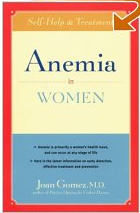Anemia: General Information, Causes, Symptoms and Conventional & Holistic Treatment Options as well as Disease Prevention
The below provides a general overview on this topic and may not apply to everyone. Any treatment protocol should be discussed with a qualified healthcare practitioner ... Please refer to: Medical & Legal Disclaimer.
More than 3 million people in the United States have anemia.
Anemia occurs when you have less than the normal number of red blood cells in your blood or when the red blood cells in your blood don't have enough hemoglobin. Hemoglobin is a protein that gives the red color to your blood. Its main job is to carry oxygen from your lungs to all parts of your body.
Key Facts About Anemia
- • If you have anemia, your blood does not carry enough oxygen to all the parts of your body
- • Without oxygen, your organs and tissues cannot work as well as they should
- • Women and people with chronic diseases are at the greatest risk for anemia
Anemia happens when:
The body loses too much blood (such as with heavy periods, certain diseases, and trauma); or
- • The body has problems making red blood cells; or
- • Red blood cells break down or die faster than the body can replace them with new ones; or
- • More than one of these problems happen at the same time
Other Causes:

Lead Exposure
Lead exposure can cause severe anemia, permanent brain damage and other problems through increasing RBC fragility.
According to a recent nationwide survey, 900,000 American children aged one to five have blood lead levels higher than the Center for Disease Control's level of concern (Source: Natural Resources Defense Council - http://www.nrdc.org). Particularly vulnerable are infants, small children and pregnant women.
Also refer to Lead in your Drinking Water
Related Diseases
Such as Sickle cell anemia, Thalassemia, or Cooley's anemia
Note: GreenAndHealthy.Info focuses on nutritional support and holistic treatments -- for more detailed information on the above, including symptoms and traditional options, please review the attached pdf file provided by womenshealth.gov.
Nutritional Support for Iron deficiency anemia (IDA):
Eat foods high in iron:
Bananas
High in iron, bananas can stimulate the production of hemoglobin in the blood and so helps in cases of anemia
(100% iron-fortified is best. Check food label.)
Like spinach
(lean only) - click here to find the best and worst fish to eat
Like apricots, prunes, and raisins
Nutritional Support for Vitamin Deficiency Anemia (or Megaloblastic Anemia):
Eat foods high in Vitamin B12 or Folate:
Vitamin B12
Is found in foods that come from animals. Fortified breakfast cereals also have vitamin B12. Folic acid supplements (pills) can treat this type of anemia. But, folic acid cannot treat nerve damage caused by a lack of vitamin B12. The treatment depends on the cause. But you may need to get vitamin B12 shots or take special vitamin B12 pills.
Folate Deficiency
Folate is a B vitamin found in foods such as leafy green vegetables, fruits, and dried beans and peas. Folic acid is found in fortified breads, pastas, and cereals.
Alternative Treatment Options:
Wheat Grass / Wheat Grass Juice
Wheatgrass juice has been successfully used to treat anemia in humans and repair the liver. It packs natural enzymes, vitamins A, B, C, E and K, calcium, chlorophyll, iron, lecithin, magnesium, pantothenic acid, phosphorus, potassium, amino acids, trace elements and protein.
Benefits:
- • Cleanses the blood by improving oxygen supply to the circulatory system
- • Detoxifies and regenerates the liver
- • Protects us from carcinogens in our food or environment
- • Expands blood vessels and improves circulation
- • Improves oxygenation of blood and ability to rid blood of toxins
Hydrogen Peroxide
Therapy has been used successfully to treat anemia. (As always such treatments should only be undertaken under their care and supervision of a qualified health practitioner)
Signs of anemia:
- fatigue (very common)
- weakness (very common)
- dizziness
- headache
- numbness or coldness in hands and feet
- low body temperature
- pale skin
- rapid or irregular heartbeat
- shortness of breath
- chest pain
- irritability
- not doing well in work or school
All of these signs and symptoms can occur because your heart has to work harder to pump more oxygen-rich blood through the body.